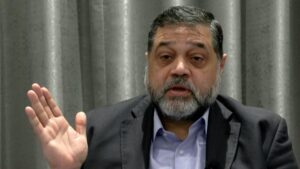Pentagon blows deadline to explain US role in Nigerian airstrike that killed 160 civilians
The Pentagon’s stated commitment to transparency on civilian casualties faced questions Tuesday in an Intercept report noting that the Department of Defense has failed to respond to a group of House Democrats who set a three-month deadline to explain the U.S. military’s role in a 2017 Nigerian airstrike that killed more than 160 non-combatants.
On September 8, Reps. Sara Jacobs (D-Calif.), Jason Crow (D-Colo.), Ro Khanna (D-Calif.), Tom Malinowski (D-N.J.), and Andy Kim (D-N.J.)—the Protection of Civilians in Combat Caucus—sent a letter to Defense Secretary Lloyd Austin citing reporting that the U.S. military provided Nigerian forces with intelligence support ahead of a January 17, 2017 airstrike on a refugee camp in Rann, Borno state, in the country’s northeastern corner.
Nigeria bombed the camp believing it was a base for Boko Haram fighters. More than 160 civilians died in the attack, including six Red Cross aid workers. A formerly classified U.S. military document obtained by The Intercept referred to the strike as a “U.S.-Nigerian” operation. Days after the attack, U.S. Africa Command (AFRICOM) secretly ordered a probe of the airstrike.
The lawmakers asked what was the nature of U.S. involvement in the strike, whether the military provided intelligence or other support to its Nigerian partner, and other questions, asking Pentagon officials to reply “no later than 90 days” after they received the letter. That deadline was nearly two weeks ago.
“The Pentagon’s failure to provide information and documents… to determine possible U.S. involvement in an airstrike that took many civilian lives in northeast Nigeria does not bode well for the U.S. government’s expressed commitment to transparency and accountability,” Human Rights Watch Nigeria researcher Anietie Ewang told The Intercept.
“It sends a worrisome message that, at minimum, the Defense Department is unwilling to engage on an issue affecting countless lives and may even reflect an attempt to evade responsibility,” she added.
Moreover, The Intercept‘s Nick Turse writes:
In August, the Pentagon unveiled a Civilian Harm Mitigation and Response Action Plan, which provides a blueprint for improving how the U.S. military addresses civilian harm. The plan calls for a new emphasis on the “proactive release of information” and “transparency regarding [Defense Department] policies and processes for mitigating and responding to civilian harm”—but not until next year.
The formerly secret AFRICOM document obtained by The Intercept, along with reporting by Nigerian journalists and interviews with experts, suggests that the U.S. may have launched this rare internal investigation because it secretly provided intelligence or other support to the Nigerian armed forces who carried out the deadly strike.
Asked to comment on the missed deadline, Pentagon spokesperson Col. Phillip Ventura told The Intercept that “I don’t think we’re going to get a lot of joy on this one.”
“The Department of Defense is aware of the matter and addressing the concerns of Congress directly with them,” Ventura told the outlet after the article’s publication.
Originally published at Commondreams.org.












